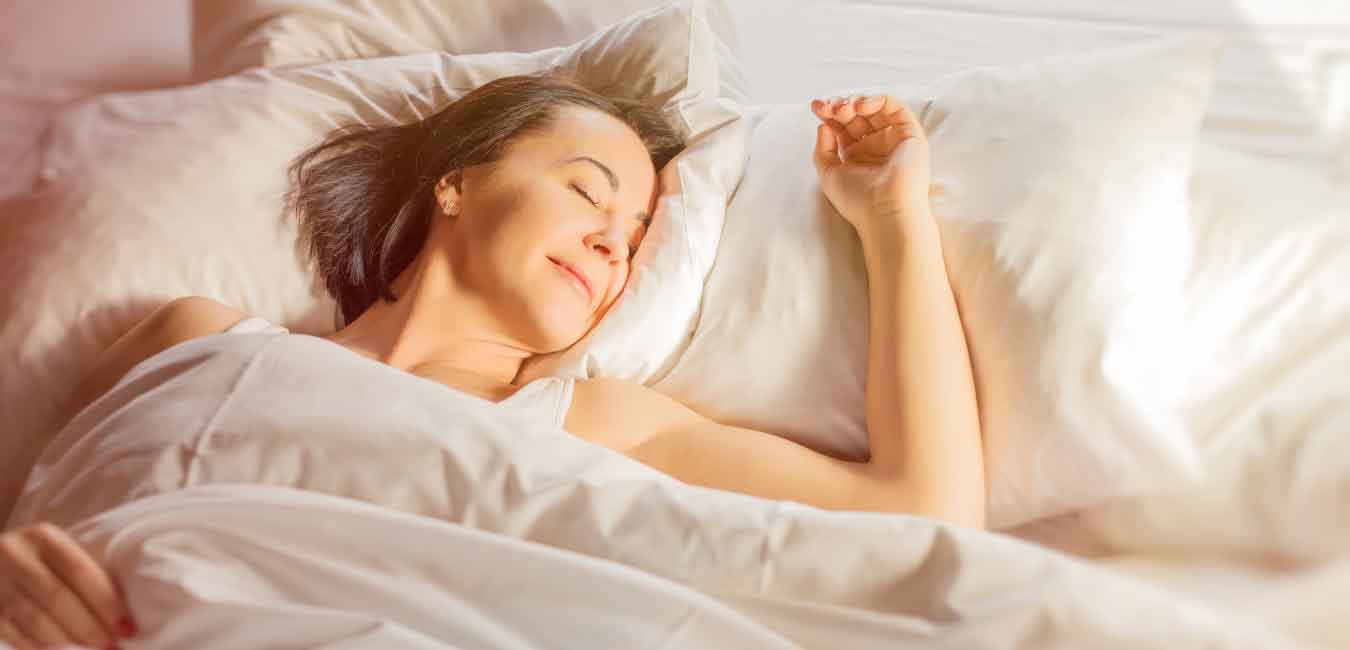Trouble getting to sleep.
Waking multiple times during the night.
Bizarrely vivid dreams.
I think most of us have had at least a few disturbed nights over the last year. But trouble sleeping isn’t just a symptom of the pandemic: many of us didn’t exactly sleep like babies before March 2020 either.
The worst thing is, we tend to accept it as a normal part of parenthood, of having busy lives, of juggling work with family life…of living in our modern world.
Being sleep-deprived actually begins to feel normal and we adjust our lives accordingly by relying on coffee, carbs, or the odd mid-afternoon choccy bar to help us through the day.
And it’s not doing us any favours. Not getting the requisite 7-9 hours of good-quality sleep a night can impact everything from your cognitive function and your physical health to your mental health and your capacity to handle stress.
So if you are experiencing occasional sleep disturbances, it’s worth having a look at how you can set yourself up for a great night’s sleep — and I have five fundamental strategies that I swear by (most of the time!)
5 simple(ish) steps to a great night’s sleep.
Step 1: Have dinner a little earlier.
This is why I say these steps are simple-ish.
I know that getting dinner on the table early isn’t always easy. But, because a busy digestive system can disturb your sleep, eating as early as possible is a really effective way to help your body into rest mode.
So let’s make it a little easier. Try making the most of your slow cooker, if you have one. Spend some time at the weekend researching family dinners that don’t take long to prepare. Rope your partner or kids into helping you with food prep. Or try batch cooking on your days off so you always have something healthy to pop in the oven.
Step 2: Have a relaxing evening.
Very few people fall asleep as soon as their head hits the pillow — the rest of us need time to ease into sleep. And one of the ways to make this easier is to send your body signals that it’s nearly time to end your day.
Resist the temptation to knock out a HIIT workout right before bedtime or to ‘just check your emails for a minute’. Going back into work mode or doing high intensity exercise is a prime way to ramp your body back into energy mode.
Instead, try to find ways to promote relaxation at least a couple of hours before you plan to go to bed. You could try journaling, reading, crafting (I’m finding needle punch is amazing for pre-bed chill time), or even colouring.
Anything that allows your body to slow down and your mind to clear will help promote healthy sleep.
Step 3: Switch off your devices.
How many times have you had a lovely relaxing bath or done some gentle yoga before bed and then had one last scroll through social media before lights out. Then, before you know it, you’re seething at the latest news or trying to decide whether you can afford those shoes you just saw advertised on your newsfeed.
Even if you’re not so easily distracted, the blue light from your phone screen can play havoc with the production of melatonin, the sleep hormone.
That’s why sleep experts generally recommend switching your screens off at least an hour before bed and ideally, moving them out of the bedroom altogether.
Step 4: Make your room a sleep sanctuary.
There are many physical ways we can let our bodies know that sleep should be on the horizon and you can design your room to be a sleep sanctuary.
First up, if you’re still clinging to your screens, try removing them from your bedroom for at least a week — just to see if it makes a difference. So, leave your phone in the other room and if you have a TV in your bedroom, you could chuck a throw over it so you’re not tempted by a late-night Netflix session.
Using your phone as your alarm clock? If you’re serious about getting more sleep, an alarm clock might just be the best investment you could make!
The temperature and lighting are also important. The ideal temperature for promoting sleep is between 15 and 19 degrees — obviously if you run a little hot, you’d be better going for the lower end of that scale. As for light: gradually dimming the lights as you wind down for the night sends your body and brain the right signals and it’s worth using an eye mask or blackout blinds if there’s a lot of light shining into your bedroom from outside.
Step 5: Go to bed ½ an hour earlier.
I know, I know, this is the one tip you don’t want to hear.
I get it. When you haven’t stopped all day and then you have the nightly fight to get the kids to settle down at a decent time, the last thing you want to do is start thinking about going to bed yourself.
And settling down to watch some telly with a G&T or a tub of Ben & Jerry’s feels like the ultimate in self-care.
However, while it feels, in that moment, like you’re serving yourself really well, you’re actually doing yourself a huge disservice. You’re setting yourself up for a poor night’s sleep and everything that brings with it the next day: low energy, lack of patience, heightened anxiety, feeling down, and relying on sugary snacks to make it through the afternoon.
I’ve been there myself — more than once! So what I’ve been finding helpful is to commit to going to bed just a half hour earlier than usual. I set an alarm on my phone to remind me (and so I don’t end up getting sucked into ‘just one more episode’) and then make sure I follow through.
It has made a huge difference, not just to the quality of my sleep, but to my energy levels and my mood the next day. And that extra dose of energy means I’m able to dedicate the free time I do have to self-care activities that are far more fulfilling and enjoyable than slumping in front of the TV all evening!
It’s all too easy to dismiss the impact of poor sleep on every aspect of our lives but when you finally start sleeping well, the difference is astonishing. Everything just feels so much…easier. You have the energy and the motivation to eat well, to move your body in joyful ways, to show up for your family and friends, and to spend time doing the things you love.
So, if you’re exhausted from dusk ‘til dawn, more often than not, give these steps a try and let me know how you get on.
If you think you could use a more personalised sleep strategy, I’d love to help. Through my 1:1 coaching I help women like you find more balance and energy in their lives so they’re finally able to overcome burnout, cope with stress more effectively, and fall in love with their lives again.
Loved this?
Try this next:


0 Comments